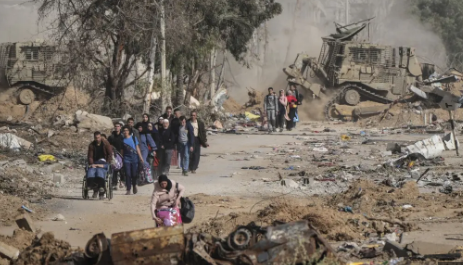New York (Web Desk): The United Nations (UN) officials expressed deep concern on Tuesday over the continued closure of critical border crossings into Gaza, warning that this could worsen the already dire humanitarian situation.
These crossings, including Kerem Shalom, Zikim, and Erez, have been shut for three consecutive days, causing severe disruptions to the delivery of humanitarian supplies into the besieged region.
The closure has been particularly damaging, as it prevents the flow of essential goods needed to assist the population, who have already endured months of conflict, hunger, and deprivation.
Stephane Dujarric, the spokesperson for the UN, explained that humanitarian organizations had been unable to collect or transport aid through the Kerem Shalom crossing, as Israeli authorities rejected requests to facilitate the movement of vital supplies.
He stressed that these delays are exacerbating the suffering of Gaza's civilians and warned that if the situation persists, it would have catastrophic consequences for those still trying to recover from the war.
Dujarric called on international players to exert pressure on those involved to ensure the ceasefire holds and humanitarian access is restored.
Philippe Lazzarini, head of the UN Relief and Works Agency (UNRWA), also condemned the decision to halt aid, urging that the steady flow of humanitarian assistance be maintained, especially given the scale of need.
He emphasized that most of Gaza’s population depends on international aid for basic survival, pointing out that essential services like water, electricity, and medical care must continue uninterrupted.
Lazzarini added that aid must remain impartial and should not be manipulated for political or military leverage.
Despite the closure of the crossings, UN agencies and other partners continue their operations in Gaza, working to provide some relief to the population. Medical services have resumed at local hospitals, with dialysis and paediatric care being offered to those in need.
The World Health Organization (WHO) facilitated the medical evacuation of dozens of children and their companions to Jordan, marking the first such evacuation since the ceasefire began.
Additionally, the WHO has provided hygiene and sanitation supplies to vulnerable groups, particularly women and children, in an attempt to prevent further public health crises in the region.
Meanwhile, in the West Bank, Israeli military actions in Jenin have intensified, further complicating the situation.
The ongoing military operations have led to additional displacement, with entire families forced to flee their homes.
Bulldozers have been used to destroy infrastructure, leading to power outages, while movement restrictions in and out of the city have been strictly enforced, further isolating the affected population.


